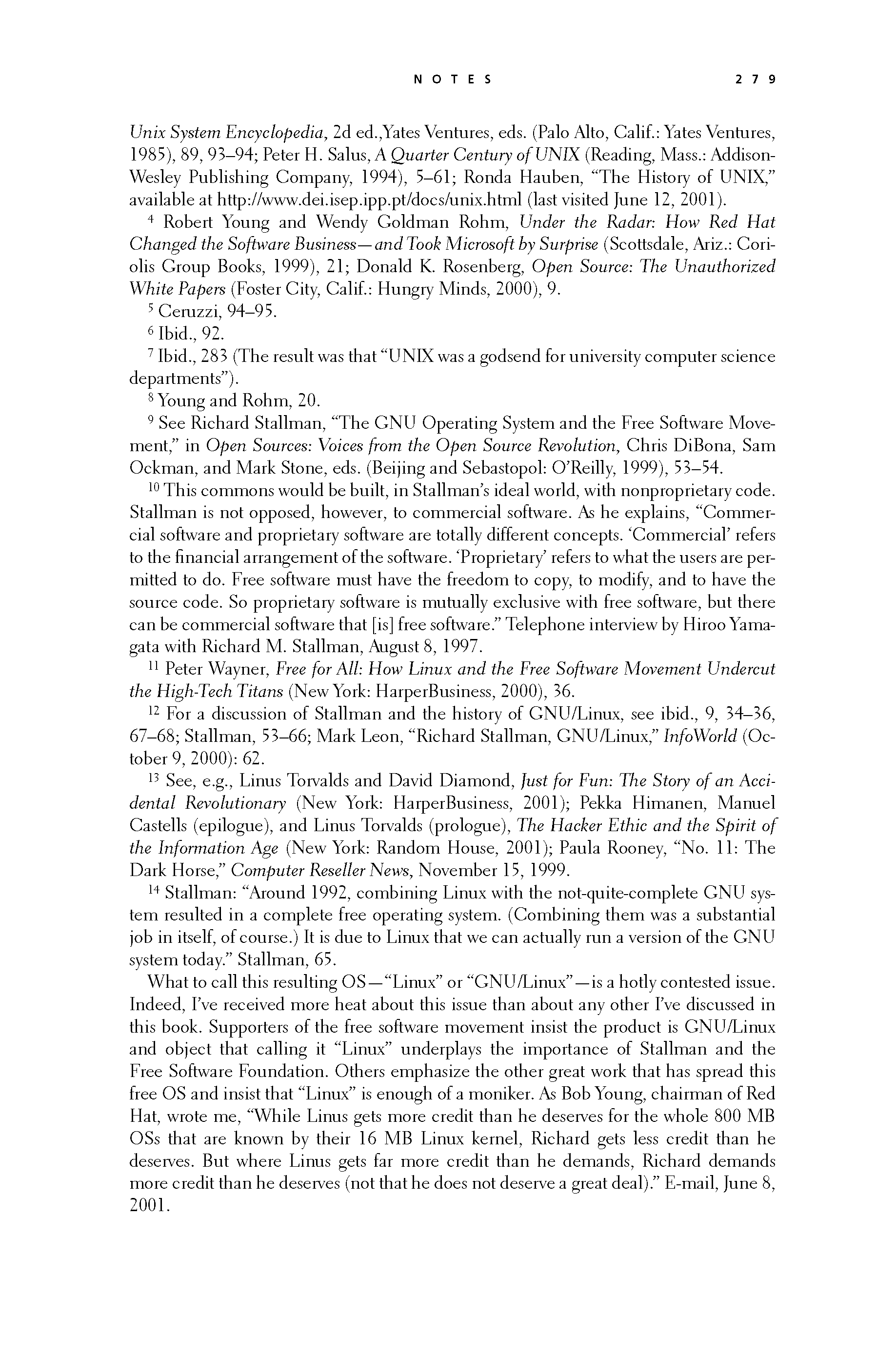 p278 _
-chap- _
toc-1 _
p279w _
toc-2 _
+chap+ _
p280
p278 _
-chap- _
toc-1 _
p279w _
toc-2 _
+chap+ _
p280
_Unix_System_Encyclopedia,_ 2d ed., Yates Ventures, eds. (Palo Alto, CA: Yates Ventures,
1985), 89, 93-94; Peter H. Salus, _A_Quarter_Century_of_UNIX_ (Reading, Mass.: Addison-
Wesley Publishing Company, 1994), 5-61; Ronda Hauben, "The History of UNIX,"
available at http://www.dei.isep.ipp.pt/docs/unix.html (last visited June 12, 2001).
[4-4] Robert Young and Wendy Goldman Rohm, _Under_the_Radar:_How_Red_Hat_
_Changed_the_Software_Business_--_and_Took_Microsoft_by_Surprise_ (Scottsdale, Ariz.: Cori-
olis Group Books, 1999), 21; Donald K. Rosenberg, _Open_Source:_The_Unauthorized_
_White_Papers_ (Foster City, CA: Hungry Minds, 2000), 9.
[4-5] Ceruzzi, 94-95.
[4-6] Ibid., 92.
[4-7] Ibid., 283 (The result was that "UNIX was a godsend for university computer science
departments").
[4-8] Young and Rohm, 20.
[4-9] See Richard Stallman, "The GNU Operating System and the Free Software Move-
ment," in _Open_Sources:_Voices_from_the_Open_Source_Revolution,_ Chris DiBona, Sam
Ockman, and Mark Stone, eds. (Beijing and Sebastopol: O'Reilly, 1999), 53-54.
[4-10] This commons would be built, in Stallman's ideal world, with nonproprietary code.
Stallman is not opposed, however, to commercial software. As he explains, "Commer-
cial software and proprietary software are totally different concepts. 'Commercial' refers
to the financial arrangement of the software. 'Proprietary' refers to what the users are per-
mitted to do. Free software must have the freedom to copy, to modify, and to have the
source code. So proprietary software is mutually exclusive with free software, but there
can be commercial software that [is] free software." Telephone interview by Hiroo Yama-
gata with Richard M. Stallman, August 8, 1997.
[4-11] Peter Wayner, _Free_for_All:_How_Linux_and_the_Free_Software_Movement_Undercut_
_the_High-Tech_Titans_ (New York: HarperBusiness, 2000), 36.
[4-12] For a discussion of Stallman and the history of GNU/Linux, see ibid., 9, 34-36,
67-68; Stallman, 53-66; Mark Leon, "Richard Stallman, GNU/Linux," _InfoWorld_ (Oc-
tober 9, 2000): 62.
[4-13] See, e.g., Linus Torvalds and David Diamond, _Just_for_Fun:_The_Story_of_an_Acci-_
_dental_Revolutionary_ (New York: HarperBusiness, 2001); Pekka Himanen, Manuel
Castells (epilogue), and Linus Torvalds (prologue), _The_Hacker_Ethic_and_the_Spirit_of_
_the_Information_Age_ (New York: Random House, 2001); Paula Rooney, "No. 11: The
Dark Horse," _Computer_Reseller_News,_ November 15, 1999.
[4-14] Stallman: "Around 1992, combining Linux with the not-quite-complete GNU sys-
tem resulted in a complete free operating system. (Combining them was a substantial
job in itself, of course.) It is due to Linux that we can actually run a version of the GNU
system today." Stallman, 65.
What to call this resulting OS -- "Linux" or "GNU/Linux" -- is a hotly contested issue.
Indeed, I've received more heat about this issue than about any other I've discussed in
this book. Supporters of the free software movement insist the product is GNU/Linux
and object that calling it "Linux" underplays the importance of Stallman and the
Free Software Foundation. Others emphasize the other great work that has spread this
free OS and insist that "Linux" is enough of a moniker. As Bob Young, chairman of Red
Hat, wrote me, "While Linus gets more credit than he deserves for the whole 800 MB
OSs that are known by their 16 MB Linux kernel, Richard gets less credit than he
deserves. But where Linus gets far more credit than he demands, Richard demands
more credit than he deserves (not that he does not deserve a great deal)." E-mail, June 8,
2001.
[[279]]
p278 _
-chap- _
toc-1 _
p279w _
toc-2 _
+chap+ _
p280